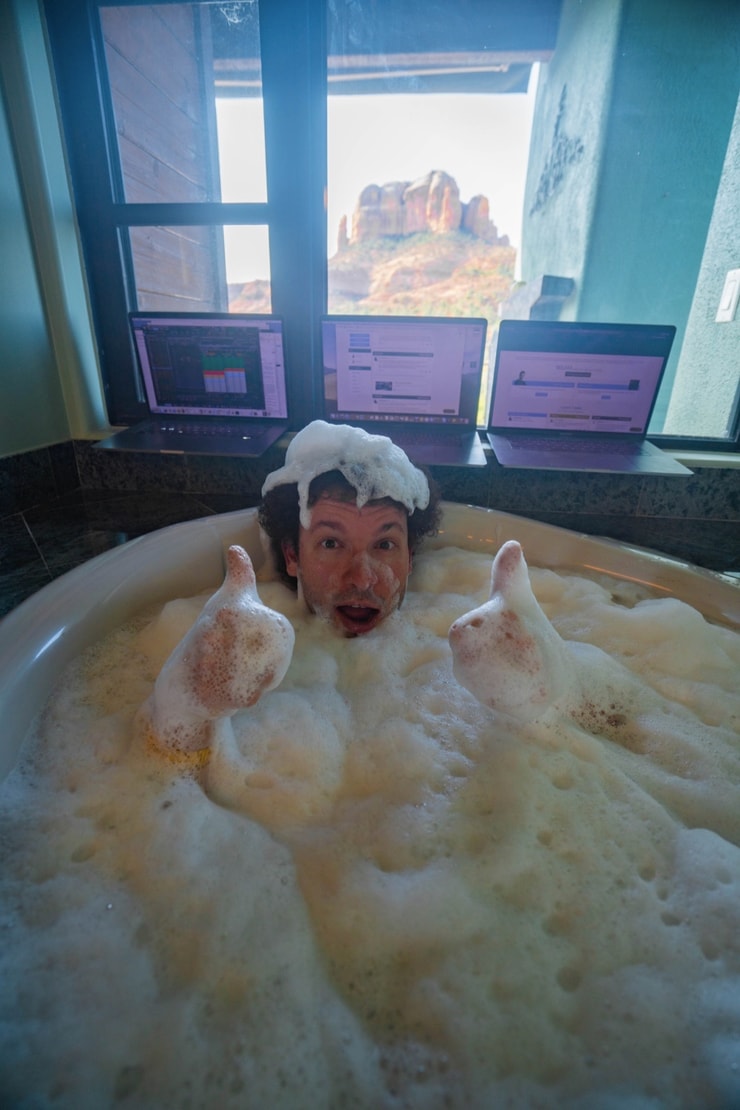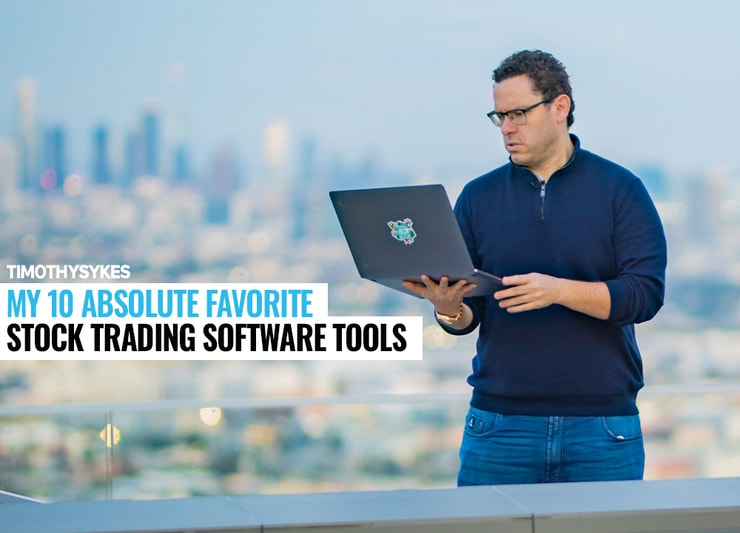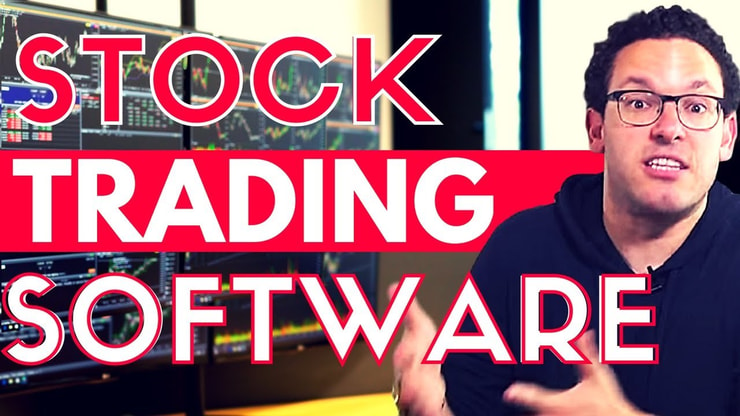If you want to be a successful stock market trader, you need good software at your fingertips.
Attempting to research the market manually will only slow you down.
The top stock trading software programs provide alerts, watchlists, charts, and more. They help you organize your trading process and capitalize on real-time events.
When you’re not sure what type of stock trading software to use, I’ve got you covered. Let’s look at my top 10 picks as well as a few tips on taking advantage of stock trading software.
Table of Contents
- 1 What Is Stock Trading Software?
- 2 My Favorite 10 Stock Trading Software List
- 2.1 Top Penny Stock Trading Software
- 2.2 Online Stock Trading Software for Market Data
- 2.3 Best Stock Trading Software for Day Traders
- 2.4 Best Technical Analysis Software
- 2.5 Top Stock Trading Platform for Decision Support
- 2.6 Top Stock Trading Platform for Taxes
- 2.7 Top Stock Screener Software
- 2.8 Top Stock Charting Software
- 2.9 Other Advanced Trading Software Options
- 2.10 Top Stock Trading Platform for Beginners
- 3 The Bottom Line
What Is Stock Trading Software?
Stock trading software is a program that allows you to research potential stocks, view charts, read analyses, set up watchlists, and more.
Much of the stock market has become mechanized, with many of the top hedge funds using extremely sophisticated computer programs to parse data at incredible speeds.
Most of us don’t have access to those programs, but that doesn’t mean we can’t take advantage of technology.
The best stock trading software makes you a better trader. In other words, it’s easy to use, comfortable, intuitive, and feature-rich. It also provides you with actionable information.
Importance of Accurate Stock Market Data
Unfortunately, there are lots of stock trading software options out there that don’t work as advertised. They’re clunky, difficult to use, and light on accurate market data.
Day traders, in particular, need information quickly. We rely on near-real-time information to make trading decisions, and if we get inaccurate data, we’re screwed.
That’s where online reviews come in. People who have bad experiences with stock-trading software often vent about it. If they provide specifics about what irritated them and what information was faulty, you can probably trust that the software they’re reviewing isn’t for you.
How to Properly Use Stock Trading Software

Even the most intuitively designed stock trading software programs can look intimidating to the beginner. Don’t turn and run. Instead, immerse yourself in the program and get used to its features and navigational indicators.
Depending on the specific stock market trading software, you’ll want to check out news, charts, and scanners first.
Scanners search for specific information related to the stocks in which you’re interested, while news segments provide up-to-date information about companies and stocks.
The charts are undeniably the most talked-about features for the best stock trading software programs out there. We’re all very particular about our charts — for instance, I prefer the candlestick variety — and we need charts that are easy to read, customizable, and trackable.
The top stock trading software platforms out there also offer paper trading, which I highly recommend. Think of paper trading as a stock simulation program. You execute trades — buy, sell, and short — without putting any money on the line. If you’ve never traded before, this is a great way to get your feet wet.
Just don’t hang out in the shallows too long. Once you’re comfortable with paper trading, move on to the real thing. Otherwise, you never stand to profit from the stock market.
Master Your Skills with the Trading Challenge
Everyone uses stock trading software differently. My Trading Challenge students always surprise me by revealing new strategies they use to comb data from software programs.
Regardless of your experience in the stock market, the Trading Challenge provides you with access to all my trades, multiple webinars every week, advice from me and my top students, and tons of other valuable resources.
Here’s the thing: I’ve done it. I still trade regularly, travel, build schools through my charity, and indulge in luxuries when the mood strikes.** But my passion now lies in passing on what I’ve learned to others. It’s what gets me out of bed in the morning.
If you’re committed to learning to trade in the stock market, apply to become my next Trading Challenge student. I spend my time helping others master pennystocking and other aspects of the stock market, and I want to help as many people succeed as possible.
My Favorite 10 Stock Trading Software List

Now that we’ve covered some of the basics, let’s jump into the meat of this post …
What’s the top stock trading software? What programs can you use to help you make better trades?
There’s never a one-size-fits-all example. Even when there’s a clear leader in the space, you have outliers who prefer something else.
Take Google. It’s far and away the most popular search engine, right? Heck, it’s a verb. Want to know the answer to a question? Google it.
But some people still set their browser homepages to Yahoo! or Bing. They prefer some aspect of one of those search engines, so they use them instead of Google. There’s nothing wrong with that.
This is why I’m going to review the 10 top stock trading software programs instead of focusing on just one. Different traders have specific preferences.
More Breaking News
- RITR’s Strategic Moves Signal Potential Growth Amidst Market Challenges
- Vale S.A. Stock Soars as Goldman Sachs Raises Price Target
- Under Armour Faces Data Breach Affecting 72 Million Customers
- Price Predictions Fueled by Company Moves In Market Dynamics
Top Penny Stock Trading Software
If you’re familiar with my work at all, you know I’m a penny stock trader. It’s been my lifeblood for over two decades now, and I still love the thrill.
What’s great about pennystocking is that it’s exciting, capable of reducing your risk of loss, and challenging for both beginners and experienced traders alike.
I still lose money on trades. Not a lot (I always follow my first rule of thumb, which is to cut losses fast), but enough to keep me on my toes. There’s no such thing as guaranteed profit in the stock market.
1.) StocksToTrade
What stock trading software do I use for pennystocking and small-cap stocks?
If you research StocksToTrade, you’ll notice that it consistently gets 4+ star ratings on review sites. That’s incredible for a stock trading software program because people love to complain about these programs.
Why does StocksToTrade get such good reviews? It’s extremely versatile and useful. That’s it.
Full disclosure: I helped develop StocksToTrade. I also invested in it. I wanted a tool to help me search specifically for the low-priced stocks I love to trade. I’m proud of it, and I truly believe this platform offers the top tools for traders to find and research stocks of any price.
STT has built-in watchlists, scans, beautiful charts, and all the indicators active traders need. It also has a social media feed and a news feed. And it includes broker integration so you can trade right from the platform.
I use it every day to find the stocks that fit my strategy — like volatile penny stocks with a catalyst and high volume.
And I credit the StocksToTrade Breaking News Chat feature for a huge portion of my over $1.1 million in profits in 2020.* The guys who run this service crank out breaking news FAST.
Try a 14-day trial of StocksToTrade with Breaking News Chat for only $17!
(*Please note: My results are far from typical. Individual results will vary. Most traders lose money. I have the benefit of years of hard work, dedication, and experience. Trading is inherently risky. Do your due diligence and never risk more than you can afford to lose.)
Online Stock Trading Software for Market Data
If you’re looking for consistent, reliable market data, you need the top stock trading software for market news and liquidity data. Fundamental retail traders rely heavily on the latest news in a particular sector as well as real-time information about specific companies.
2.) Townsend RealTick
For reliable market data, check out Townsend RealTick. It’s been around for nearly three decades now, and some of the world’s finest financial institutions use it regularly. Some say that it has failed to evolve as newer stock trading programs have come onto the scene, but it’s still reliable.
Best Stock Trading Software for Day Traders
I can’t emphasize enough the importance of community when it comes to day trading. I started out in the stock market with no mentor and no community. I still figured it out, but I made a lot of mistakes in the process — and I’d like you to avoid those mistakes.
It’s easy to get lonely, frustrated, and too quick on the draw when you’re trading alone. This doesn’t mean you should invite 10 of your closest friends over to watch you live trade, unless they’re interested in trading too. A better solution is to find a supportive online community.
3.)_ Trading Alerts With Profit.ly
Think of Profit.ly as part social network, part educational resource, and part day trading analytics resource. Members post their trades — entry and exit points as well as commentary — and I do, too. You can see what I’m trading and how I’m making decisions, but don’t focus exclusively on me.
You’ll notice many traders posting great progress updates on Profit.ly.** They help other traders who might not be experiencing similar success by showing them what they’re doing wrong and how they might improve their trades. There’s lots of lively conversation as well as real-world information to learn.
Best Technical Analysis Software
The best technical analysts in the industry can look at stock charts and accurately predict future price movements. It looks like magic to an outsider, but it’s actually extremely logical.
I have developed my own stock patterns, such as the supernova, to help me spot the best trades. I spend much of my day reading charts and figuring out what stocks might help me earn a quick profit, and technical analysis software can help.
4.) Eye in the Sky Trade Planning
You might like Eye in the Sky Trade Planning if you want access to lots of technical analysis in one lightweight program. It’s a bit outdated, and the user interface could use some sprucing up, but if you can get past the aesthetics, you’ll find lots of remarkable data here.
It’s ideal for searching for stocks, viewing multiple charts, and finding the best stocks to trade now.
5.) Stock Rover
When you want something a little slicker and more modern, Stock Rover offers a viable alternative. It’s extremely comprehensive, with lots of stock charting options and customizations.
The free plan is good enough for most people, but you can pay between $80 and $280 per year to get access to premium features like multi-monitor support and greater data limits.
Top Stock Trading Platform for Decision Support
Some traders prefer to use so-called decision support software instead of technical analysis to make decisions about their trades. There’s nothing wrong with this approach, especially if you’re using the top stock trading software to do it.
6.) Jigsaw Trading
I like Jigsaw Trading because it specializes in what it does best. It provides economic indicators, resting orders, accurate current pricing for various stocks, and more. The Pace of Tape tool is a unique feature that allows you to measure volume and volatility at a glance.
But the real meat comes in the “Depth and Sales” portion of the trading platform. It gives you tons of data relative to the depth of market, including likely trader positions, the current balance between trade and momentum, alerts relative to pre-market notes, and other information.
Top Stock Trading Platform for Taxes
Anyone who has ever been self-employed knows the drudgery of tax season. Whether you’re filing quarterly or annually, you need a way to accurately report your capital gains as well as deductions and other data on your tax returns.
Some software programs help you do this better than others. The important thing is to avoid making mistakes so you don’t incur the wrath of Uncle Sam.
7.) TurboTax Prep
TurboTax Prep is one of the most popular software options for tax preparation. It makes it incredible easy to report stock options on your taxes, which can provide you with a little stress relief when you sit down with all those documents.
You can also use it to report income from day trading, long-term trades, dividends, interest, and more. Do you have real estate holdings? Report income from that, as well.
Top Stock Screener Software
Stock screening can help you quickly find stocks that meet specific criteria.
Out of all the stocks in the world, you don’t have time to research every single one. You want a computer to filter out the stocks that don’t meet your needs, then spit out a list of possibilities.
Stock screener software does exactly that. The important thing is to find a solution that provides real-time data. Otherwise, you’re a step behind other traders.
8.) Stock Vision-Power Scan
Provided by Garsworld, Stock Vision-Power Scan now has a desktop version for both Windows and Mac. The software comes with video training, but the UI is pretty intuitive. You can use it to find stocks based on numerous criteria, and it even comes with paper-trading software built in.
Top Stock Charting Software
When you just want charts, you just want charts. Believe me, I understand. Stock Charts are the backbone of any technical trader, and sometimes, you want to cut out all the noise.
9.) Worden Telecharts – TC2000
This program has been around for a while and has experienced some naming confusion. The most recent iteration is the TC2000, which is an award-winning charting tool that technical traders can use to parse data in a simple-yet-powerful environment.
Other Advanced Trading Software Options
There’s one other stock trading software option I want to mention because it’s popular, easy to use, and highly efficient. You can also use it as your broker, though you’ll want to do your research and make sure it’s the best fit for your trading needs.
10.) NinjaTrader
Lots of people use NinjaTrader as a broker, particularly for futures trading, but it also has a powerful platform for charting, market analysis, and simulation. It’s extremely sleek, which many younger traders will appreciate, and you’ll find lots of economic indicators to sort through.
Top Stock Trading Platform for Beginners
So what’s the top stock-trading software program for beginners? What should you use if you’re completely new to the game and unsure about how to proceed?
I would start with StocksToTrade because it’s comprehensive and offers all the tools you need in one place, which prevents you from having to bounce around between programs.
It’s designed for traders of all experience levels, so you’re unlikely to feel too overwhelmed when you first log in.
Join Profit.ly, as well, especially if you’re interested in penny stocks or day trading. Use it to pick up tips from more experienced traders, learn what not to do, and communicate with people who share your passion for the stock market.
The Bottom Line
The stock market is one of my favorite things in the world, but it’s also confusing — and sometimes fickle.
The top stock trading software programs can help demystify the process and give you tools to potentially make smarter trades.
Try out all 10 tools on this list to get an idea for what you like and dislike. We all have personal preferences, and if one trading platform irritates you, move on to the next.
What’s your favorite stock trading software platform?






Leave a reply